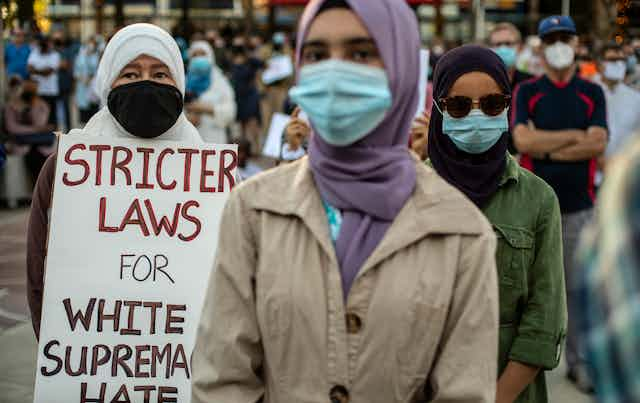Last year, as a Muslim Canadian family took their evening stroll during lockdown in London, Ont., a white man rammed his pickup truck into them. Four of the five family members were killed.
The incident sparked horror and outrage. But the truth of the matter is anti-Muslim sentiment has been on the steady rise in the 20 years since 9/11.
According to a report from July 2021 by the National Council of Canadian Muslims, more Muslims have been killed in Canada in targeted attacks and hate crimes than in any other G7 country.
Our guest on today’s episode of Don’t Call Me Resilient says that instead of deterring anti-Muslim hate, Canadian laws are actually making it worse — in essence, legalizing Islamophobia.
Natasha Bakht is an award-winning legal scholar who has spent the past five years researching the rise in anti-Muslim attitudes in North America. She is a professor in the faculty of law at the University of Ottawa and the author of In Your Face: Law, Justice, and Niqab Wearing Women in Canada.
In her book, Natasha explores the stories of niqab-wearing women who have faced discriminatory laws.
Follow and listen
Listen to this episode — and subscribe to Don’t Call Me Resilient — on Apple Podcasts, Google Podcasts, Spotify or wherever you listen to your favourite podcasts.
We’d love to hear from you, including any ideas for future episodes. Join The Conversation on Twitter, Facebook and Instagram and use #DontCallMeResilient.
To access a full transcript of the episode, go here.

ICYMI — Articles published in The Conversation
Read more: Quebec's niqab ban uses women's bodies to bolster right-wing extremism
Islamophobia and hate crimes continue to rise in Canada
Remembering the Québec City mosque attack: Islamophobia and Canada’s national amnesia
Media portrays Indigenous and Muslim youth as ‘savages’ and ‘barbarians’
Islamophobia in western media is based on false premises
Art show takes on the misrepresentation of Muslims
Additional Resources
Under Siege: Islamophobia and the 9/11 Generation by Jasmin Zine
Discourses of Denial: Mediations of Race, Gender, and Violence by Yasmin Jiwani
Natasha Bakht proclaims her Muslim identity in dance, in the Toronto Star
“Canada’s glaring Islamophobia problem” in The Tyee
Canada’s homegrown Islamophobia, Al Jazeera
To report a hate crime, go here.
Credits
Don’t Call Me Resilient is a production from The Conversation Canada. This podcast was produced with a grant for Journalism Innovation from the Social Sciences and Humanities Research Council of Canada. The series is produced and hosted by Vinita Srivastava. The co-producer on this episode is Vaishnavi Dandekar. Our other is producers are: Haley Lewis and Nahid Buie. Reza Dahya is our sound designer. Our sound producer is Lygia Navarro. Our consulting producer is Jennifer Moroz. Lisa Varano is our audience development editor and Scott White is the CEO of The Conversation Canada.

